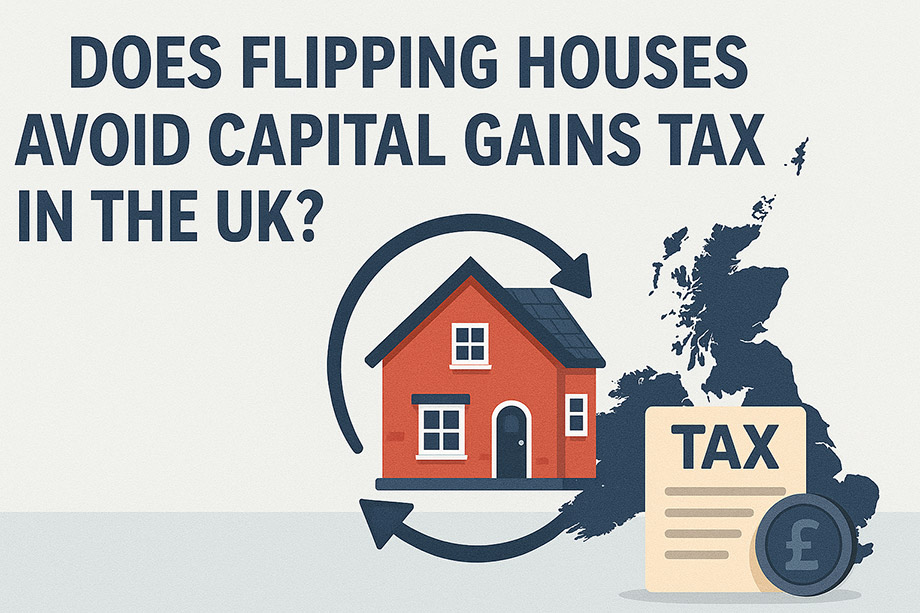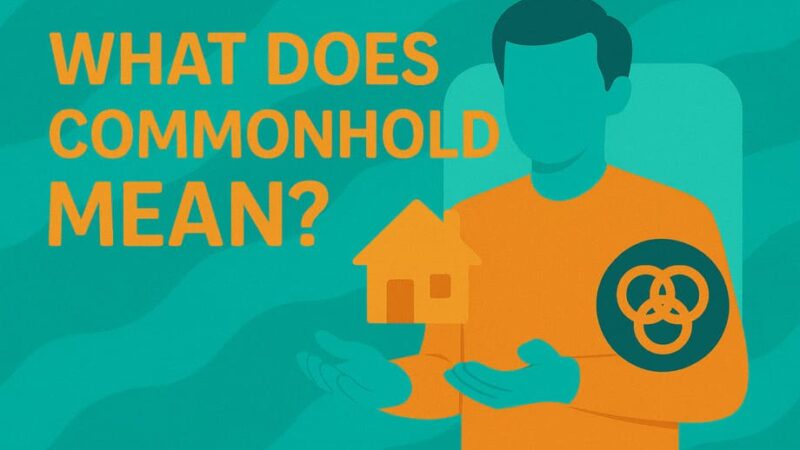Does Flipping Houses Avoid Capital Gains Tax in the UK?

Flipping houses avoid capital gains tax is a common question among property investors looking to maximise their profits. Many wonder if it’s possible to legally sidestep Capital Gains Tax (CGT) when buying, renovating, and quickly selling properties in the UK. The truth is, flipping houses does not automatically mean you can avoid CGT. Understanding how tax rules work is key to keeping your flipping business profitable and compliant.
In this article, we’ll explore the tax implications of house flipping in the UK, explain when CGT applies, how it differs from income tax, and share practical tips to manage your tax liabilities.
What Is House Flipping?
House flipping means buying a property, often in need of repair or updating, fixing it up, and then selling it quickly, usually within months, to make a profit. The goal is to increase the property’s value through renovation and market timing rather than holding it as a long-term investment.
But unlike some property investments, flipping is often considered a business activity, and the tax rules reflect that.
Understanding Capital Gains Tax (CGT) in the UK
Capital Gains Tax is the tax you pay on the profit when you sell something valuable, like property or shares, that has increased in value since you bought it. For most people selling property that is not their main home, CGT applies on the gain made.
- Current CGT rates (2025):
- Basic rate taxpayers pay 10 percent on gains from residential property.
- Higher and additional rate taxpayers pay 18 percent.
- Rates are higher than for other assets, reflecting the value and importance of residential property.
- What counts as a gain?
The difference between your sale price and the original purchase price, minus allowable costs like improvements, legal fees, and estate agent fees.
Does Flipping Houses Avoid Capital Gains Tax?
Flipping houses does not automatically allow you to avoid Capital Gains Tax. Here is why:
1. Is Flipping Seen as Investment or Trading?
HMRC distinguishes between two scenarios when you sell property:
- Capital Gains (investment):
Selling property occasionally, as a private individual, for profit. You pay CGT on the gains. - Trading (business activity):
If you flip houses frequently, renovate extensively, or treat property buying and selling like a business, HMRC might consider you a trader. This means profits count as income, taxed under Income Tax rules, which can be higher than CGT.
So, if you flip one or two houses casually, CGT usually applies. But if you regularly buy and sell properties, you might be running a property trading business, and Income Tax plus National Insurance could apply.
Private Residence Relief (PRR) and Main Residence Status
If you sell your main residence, you can usually avoid CGT thanks to Private Residence Relief (PRR). This relief means you don’t pay CGT on gains from your primary home.
Can You Use PRR to Avoid Tax on Flips?
Some people try to declare their flipped property as their main residence to use PRR. While this is legal if you genuinely live there, the strategy can be risky:
- HMRC looks at where you actually live and spend most time.
- Simply “flipping” a property without living in it cannot claim PRR.
- Changing main residence status frequently to dodge tax may trigger HMRC investigations.
In short, PRR is a valuable relief, but it is not a loophole to avoid CGT on every flip.
How Allowable Expenses Can Reduce Your Tax Bill
One effective way to reduce CGT is to deduct allowable expenses from your gains. These include:
- Costs of renovations and improvements, not just repairs.
- Legal fees, survey costs, and estate agent commissions related to buying and selling.
- Stamp Duty Land Tax in some cases.
Keeping detailed records of all expenses is essential. These costs reduce your gain and therefore the CGT you owe.
Flipping Through a Limited Company: Pros and Cons
Many property flippers set up limited companies to carry out their activities. This changes the tax landscape:
Advantages:
- Profits are subject to corporation tax (currently 25 percent) rather than CGT.
- Potentially better for reinvesting profits or expanding the business.
- Dividend tax planning options for shareholders.
Disadvantages:
- Extracting money from the company via dividends or salary can trigger additional taxes.
- More administrative work and accounting costs.
- Loss of personal allowances and some reliefs available to individuals.
Using a company can be tax-efficient in some cases, but it depends on your circumstances and goals. Consulting a tax professional is wise before choosing this route.
Tax Planning and Staying on the Right Side of HMRC
HMRC is very aware of property flipping and can scrutinize activity carefully. Here are some tips to avoid trouble:
- Be transparent: Keep honest, detailed records of all transactions and expenses.
- Understand your status: Are you an investor or a trader? Different rules apply.
- Avoid aggressive tax schemes: Trying to dodge tax unlawfully can lead to penalties and legal issues.
- Get professional advice: A qualified accountant or tax advisor can help you structure your business and transactions efficiently.
Risks of HMRC Scrutiny and How to Avoid Problems
Flipping houses without proper tax planning can lead to:
- Unexpected tax bills, including Income Tax instead of CGT.
- Penalties and interest on unpaid taxes.
- Time-consuming investigations.
To reduce risk:
- Do not flip too frequently without declaring business activity.
- Do not claim PRR improperly.
- File your tax returns accurately and on time.
Summary: What Should House Flippers Know About CGT?
- Flipping houses does not automatically avoid Capital Gains Tax in the UK.
- If you are flipping occasionally, expect to pay CGT on profits from property sales.
- Frequent flipping may be treated as trading, leading to Income Tax liability.
- Private Residence Relief can exempt your main home but has strict criteria.
- Deductible expenses can reduce your CGT bill, so keep good records.
- Using a limited company is an option with different tax implications.
- Always plan your tax strategy carefully and seek expert advice.
Final Thoughts
Flipping houses can be lucrative, but tax is a crucial piece of the puzzle you cannot ignore. Understanding how CGT applies and when Income Tax might kick in is essential to protect your profits and stay compliant with UK law.
If you are serious about flipping property, invest time in learning the tax rules or partner with a trusted accountant. It might cost upfront but could save you thousands in tax trouble down the road.
Last Updated on July 14, 2025 by James Cartwright







